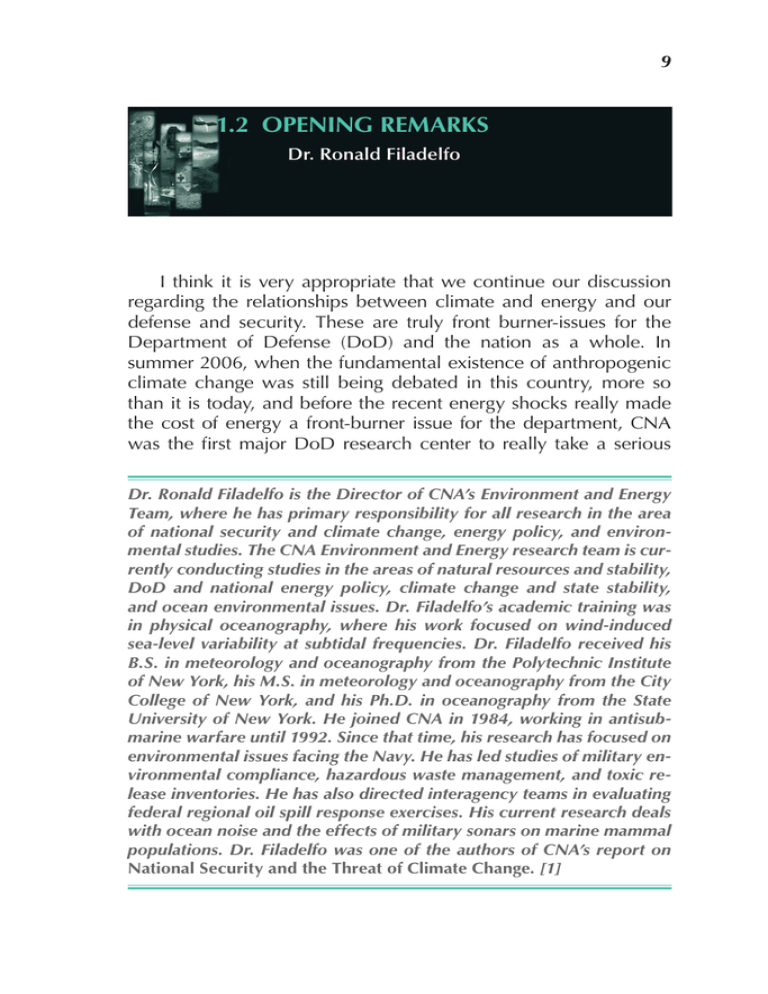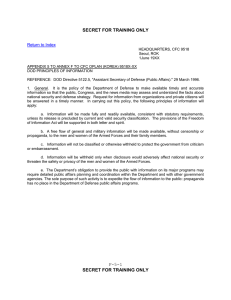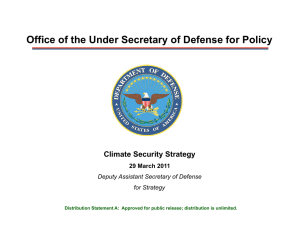1.2 oPENING REMARkS
advertisement

9 1.2 Opening Remarks Dr. Ronald Filadelfo I think it is very appropriate that we continue our discussion regarding the relationships between climate and energy and our defense and security. These are truly front burner-issues for the Department of Defense (DoD) and the nation as a whole. In summer 2006, when the fundamental existence of anthropogenic climate change was still being debated in this country, more so than it is today, and before the recent energy shocks really made the cost of energy a front-burner issue for the department, CNA was the first major DoD research center to really take a serious Dr. Ronald Filadelfo is the Director of CNA’s Environment and Energy Team, where he has primary responsibility for all research in the area of national security and climate change, energy policy, and environmental studies. The CNA Environment and Energy research team is currently conducting studies in the areas of natural resources and stability, DoD and national energy policy, climate change and state stability, and ocean environmental issues. Dr. Filadelfo’s academic training was in physical oceanography, where his work focused on wind-induced sea-level variability at subtidal frequencies. Dr. Filadelfo received his B.S. in meteorology and oceanography from the Polytechnic Institute of New York, his M.S. in meteorology and oceanography from the City College of New York, and his Ph.D. in oceanography from the State University of New York. He joined CNA in 1984, working in antisubmarine warfare until 1992. Since that time, his research has focused on environmental issues facing the Navy. He has led studies of military environmental compliance, hazardous waste management, and toxic release inventories. He has also directed interagency teams in evaluating federal regional oil spill response exercises. His current research deals with ocean noise and the effects of military sonars on marine mammal populations. Dr. Filadelfo was one of the authors of CNA’s report on National Security and the Threat of Climate Change. [1] 10 Climate and Energy Proceedings 2010 look at climate change and its implications from a national security perspective. And we did that, as many of you know, by assembling a panel of highly regarded recently retired senior (three- and four-star rank) military officers who would (1) be above partisan politics and could look at things objectively, (2) have expertise on security issues in various parts of the country, and (3) have great credibility in speaking on these issues to Congress and to the American public. Another critical aspect of that study, which gave it so much credibility and really moved the ball forward in this country, was that this panel of military leaders made very clear that they were not climate scientists and they were not going to stick their necks out and speak on the causes, the timing, or the expected severity of climate change. Rather, as national security leaders, they took the following attitude: If such-and-such change occurs in this part of the world, this is how we could see it potentially playing out in terms of stability, world geopolitics, and its implications for U.S. security posture. And because that was the take, we treated climate change very qualitatively. We did not tie our findings to any particular level of sea-level rise or any particular temperature change or even any particular timing. And, of course, that decision seems very fortunate given events of the last few months in what seems to be sort of a general regression in our level of national climate discourse. But this group of military leaders offered five broad recommendations to the DoD and to the nation as a whole: • First and foremost, they said that climate change should be included in our national security planning and national defense planning and, of course, that started with the fiscal year 2008 Defense Authorization Act. [2] The nation immediately acted upon that recommendation. • Second, they said the U.S. government, and indeed the nation as a whole, should make more of a commitment to greenhouse gas reduction and climate stability. Chapter 1 Introduction and Keynote Address 11 • Third, they said the United States should engage on the international level to help ensure that the less developed nations are going to be ready and prepared to cope with the coming changes in climate. • Fourth, DoD could help lead the way forward for national energy efficiency and development of alternative sources. • And fifth, they said DoD needs to remember to look out for itself and assess the potential implications of climate change on military installations worldwide. For the most part, all five of five recommendations have been acted upon by the defense community and the broader national security community. Of course, the first recommendation is evidenced by the inclusion of both climate change and energy in the latest Quadrennial Defense Review (QDR). [3] So I think there is now a broad acceptance of the importance of these issues to our national security and the need to include energy and climate change in national defense and national security conversations. But I think now the bigger and probably tougher questions are those that get down to specifics. That is, they get into things like force structure, what platforms, what training, perhaps what new missions our naval forces should be considering. What specific energy investments do we have to make to meet the challenges that we have heard about yesterday and that we will continue hearing about today? So it is that direction that I hope our general discussion will take today. We all agree on the importance of these issues and what we do as a Navy; thus, let’s start with that and scale it up to the DoD and the nation as a whole, so we can all move forward. The set of speakers and panels that we have assembled are very much up to that challenge. 12 Climate and Energy Proceedings 2010 ReferenceS 1. Military Advisory Board, National Security and the Threat of Climate Change, Alexandria, Virginia: CNA, 2007, http:// securityandclimate.cna.org/report/. 2. U.S. Congress, House, H.R. 1585: National Defense Authorization Act for Fiscal Year 2008, 110th Congress, 2007–2008, http:// www.govtrack.us/congress/bill.xpd?bill=h110-1585. 3. Department of Defense, Quadrennial Defense Review Report, Feb 2010, http://www.defense.gov/qdr/.


